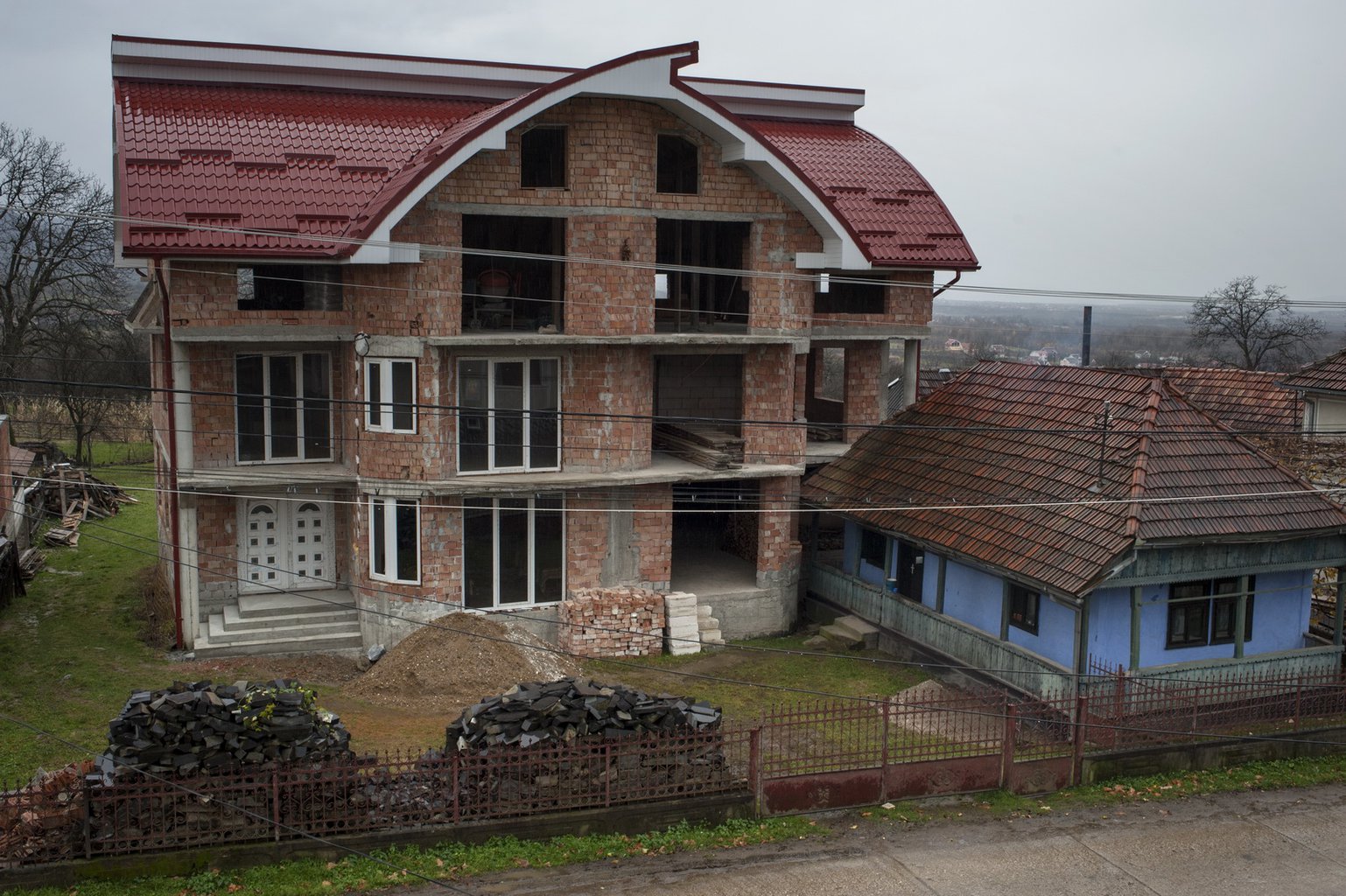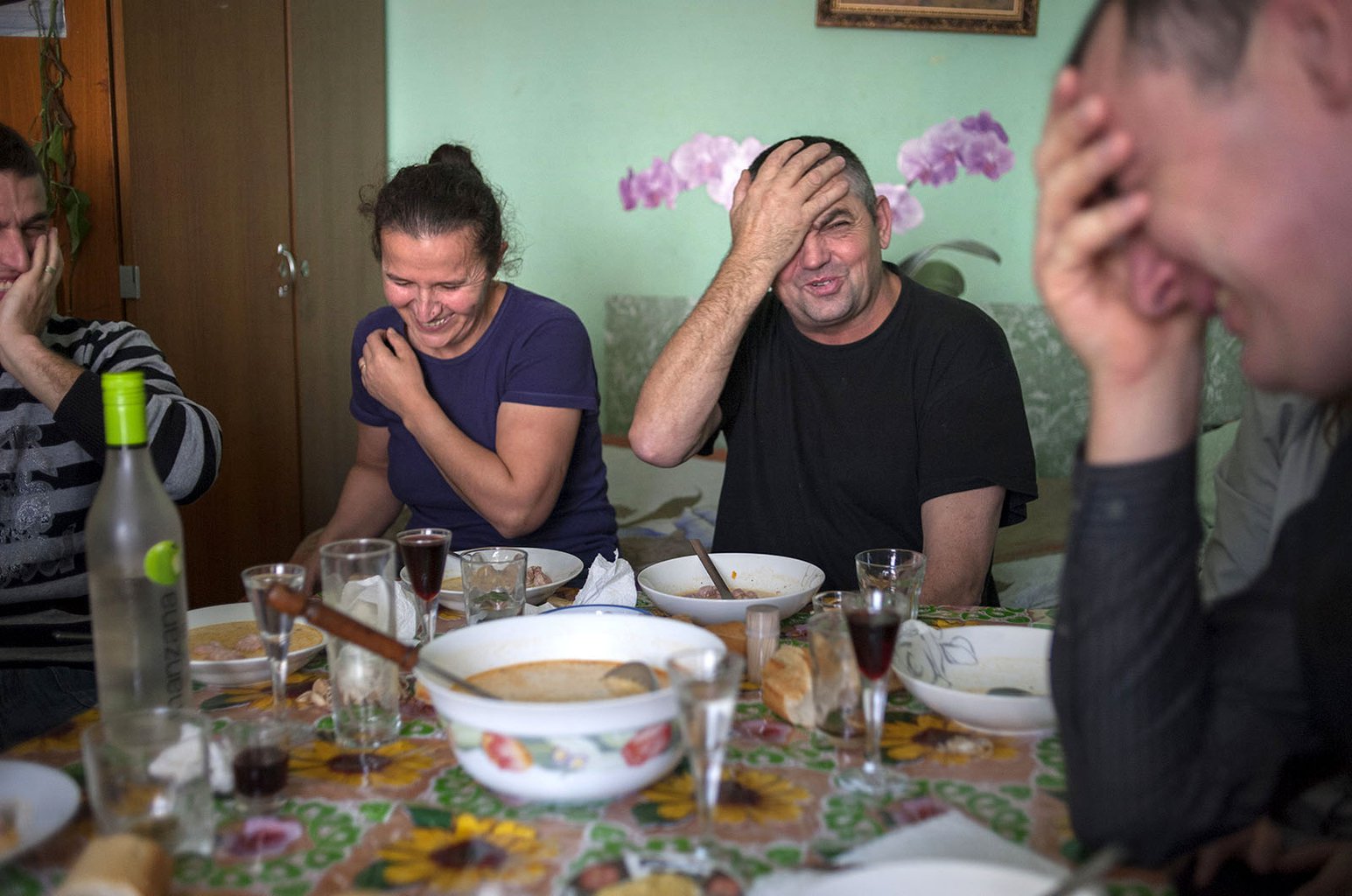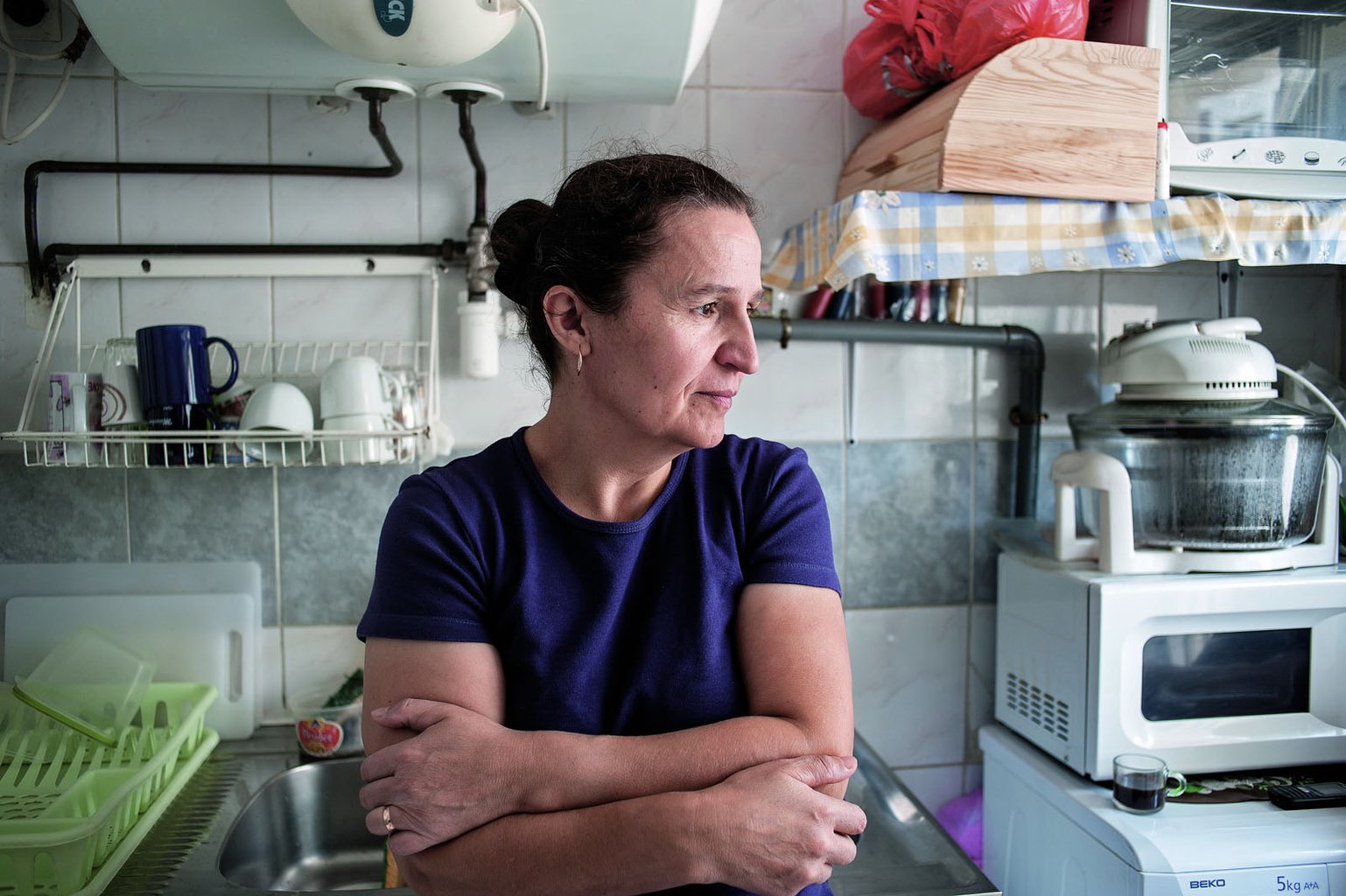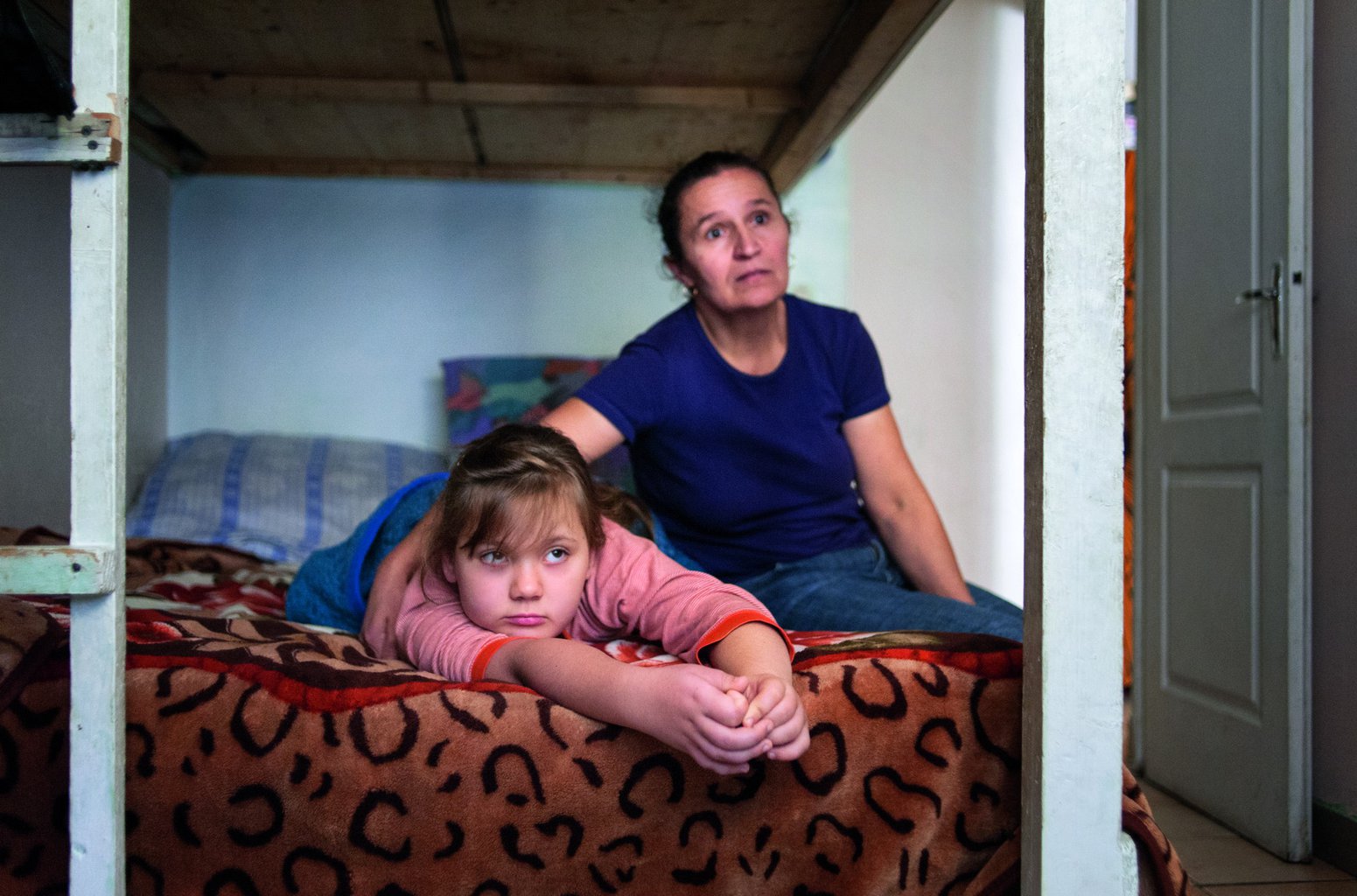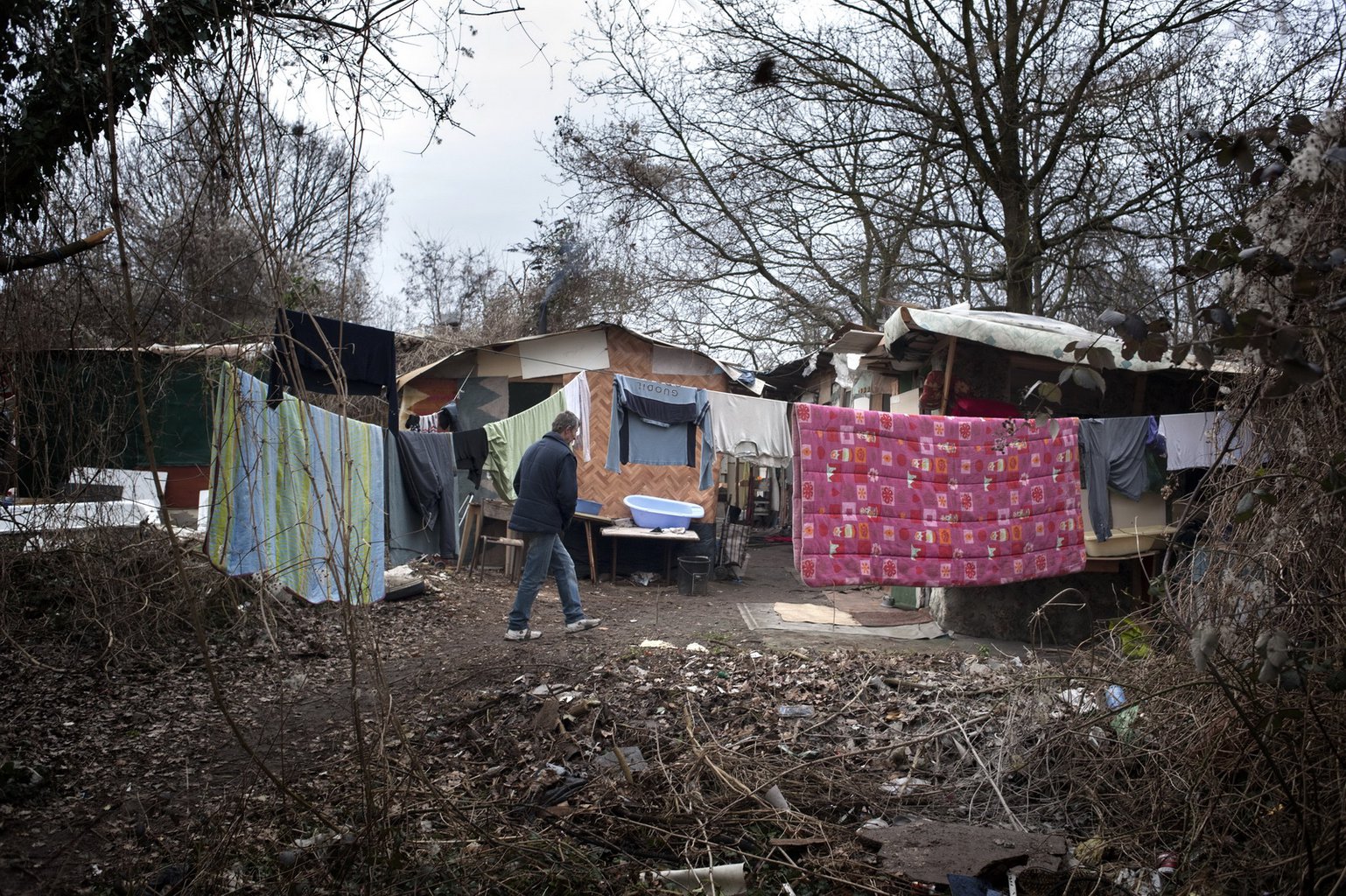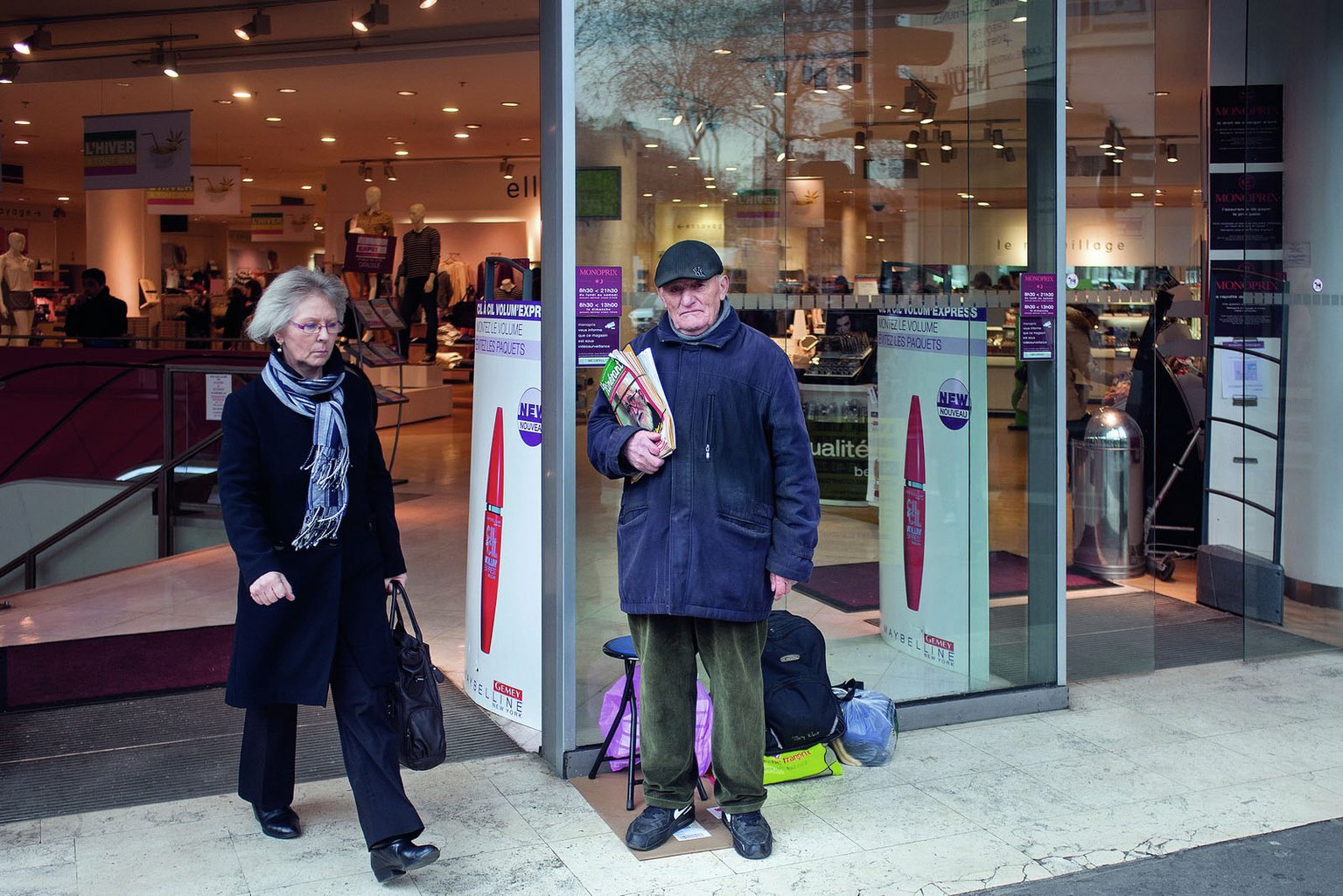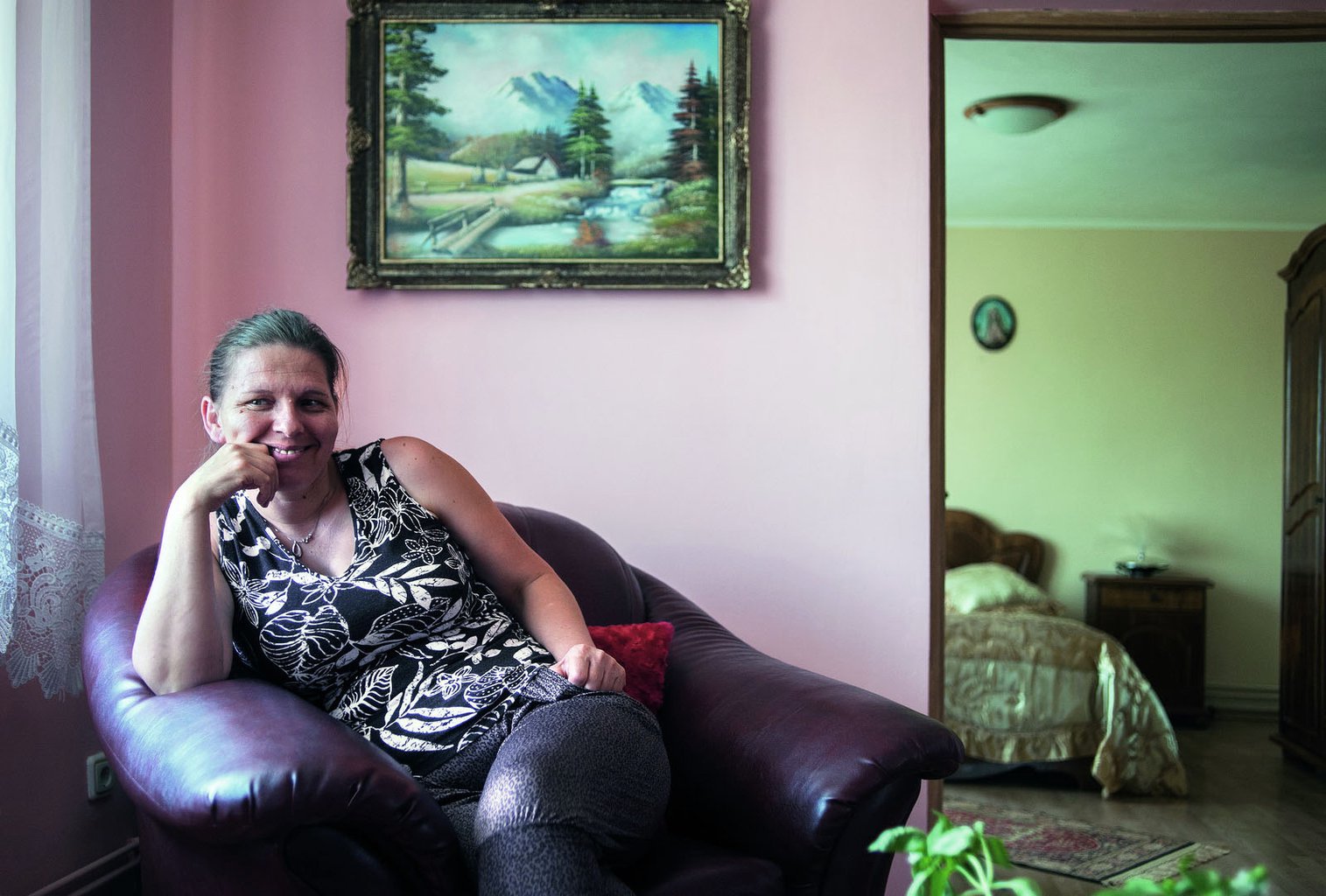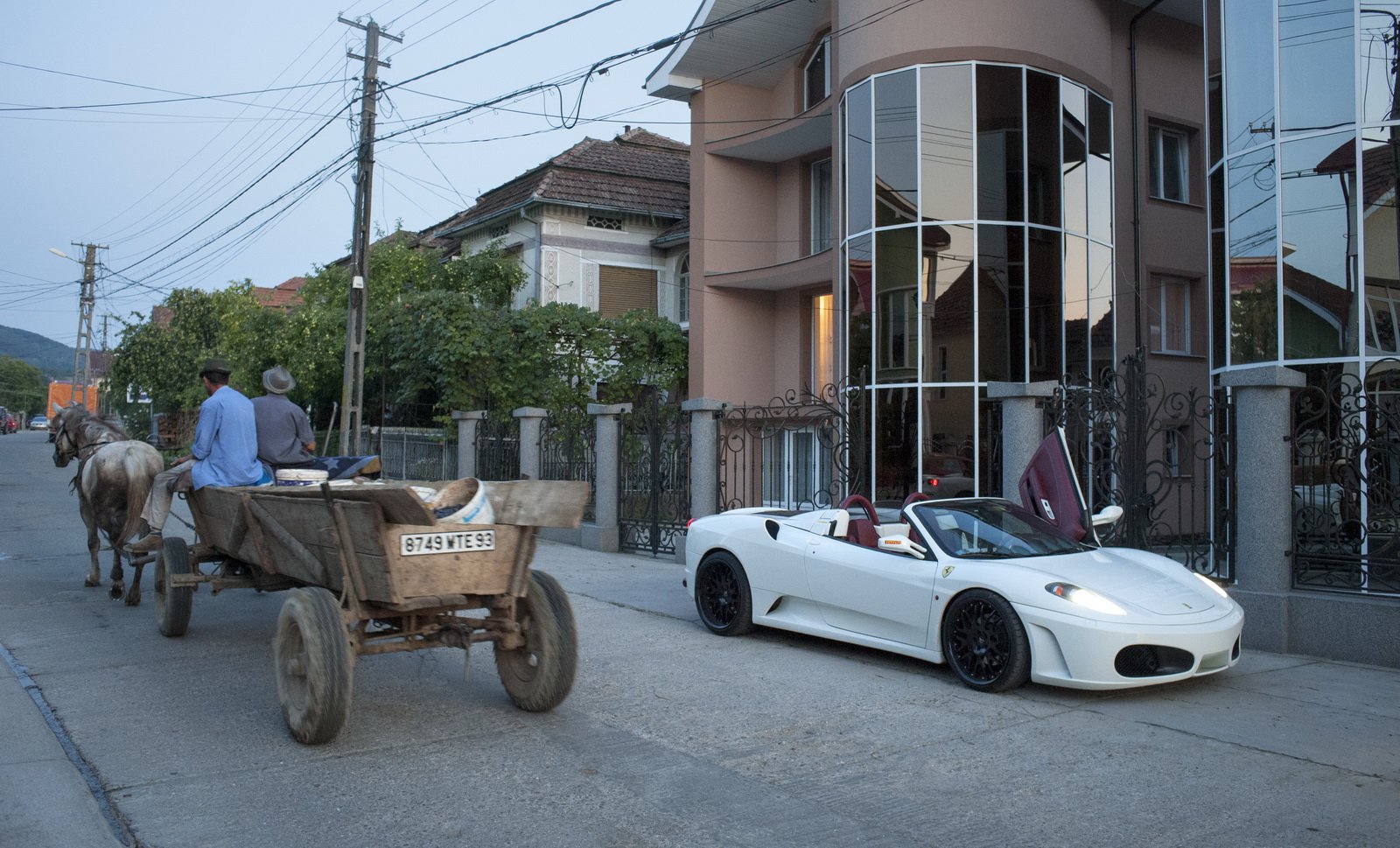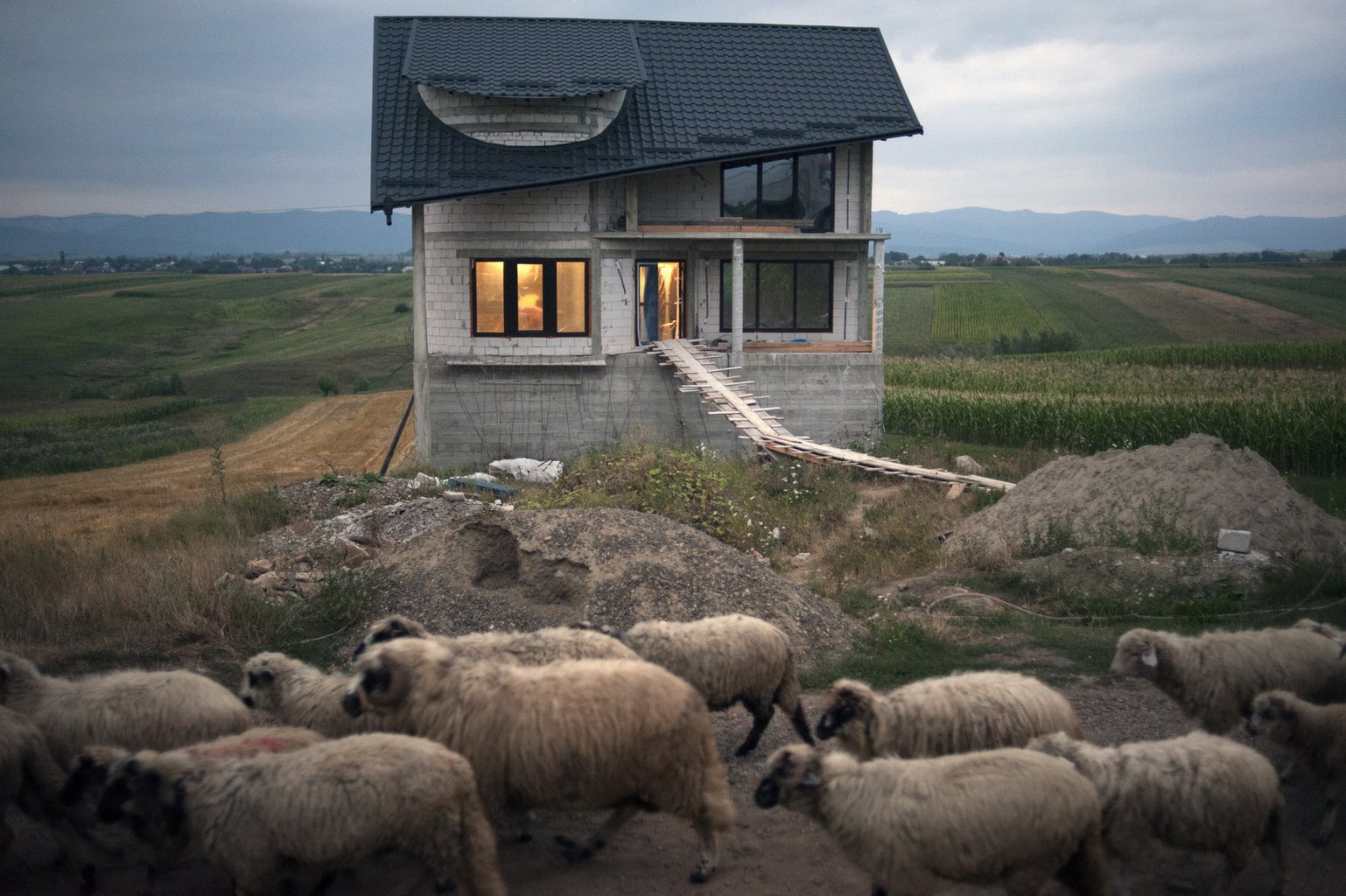Pride and Concrete
“The golden rule is - never let go of your profit. If today you make 50 Euro, you set 40 Euro aside.
"If you start indulging yourself, like going to bars and restaurants… you’re never going to make money. Never!
"As the French say: Jamais!”
Giving this advice in his small kitchen in Saint DenisThis is how we enjoy ourselves - birthdays, weddings and christenings. It is the same back home. We have never had a vacation,†Cotros, construction worker (photo © Petrut Calinescu), Ile-de-France, is Cotros from northwest Romania’s Tara Oasului, an area from where migrants having been working in France for 20 years.
On the streets outside passers-by wear brightly-colored turbans and the aroma of exotic spices drift from the kitchens of African immigrants.
But the apartment building where Cotros has lived for over ten years smells of Romanian stuffed cabbage rolls - sarmale - and meatball soup.
“My brother lives next door,” says Cotros. “My eldest son and my grandchildren on the floor above, my brother-in-law lives below me, my son’s father-in-law and my cousin are opposite… Yet it still doesn’t feel like home - and it never will!”
On a Sunday the building resonates with traditional music from Oas. Through the open apartment doors are members of 12 families, from toddlers wearing bibs to old women in traditional kerchiefs, village neighbors and other visitors, gathered around the table, talking and laughing.
“At Christmas we slaughter a pig and make caltabos [a sausage made from lungs, liver, mixed with rice and spices], just like in Romania,” he adds. “This is how we enjoy ourselves: birthdays, weddings and christenings. It’s the same back home. We’ve never had a vacation.”
Cotros is part of the vanguard of the work migrants from Romania following 1989. After the fall of Communism, when the Romanian centralized production system collapsed and work opportunities in the country vanished, the people of Oas were the first to jump the border in search of work - and willing to do any job going.
Cotros grew up with 17 brothers and a father who had a saying: be optimistic, brave and look forward. And this is how your life is going to be.
“And it has been so,” he says.
Lifetime working away
In 17 years since he has been in Paris, Cotros has taken his wife Lica to a restaurant only once. Even now they fight over the money they spend.
Lica left her home in Oas at 14, took a bus which every summer carried seasonal workers from the villages in her region around the country. Since then she has not stopped working away.
She has now been cleaning houses in France for 15 years. This has not given her the time to be a mother to her two sons and daughter.
“I grew up without parents,” says Dana Ciocan, 28, the daughter of Lica and Cotros.
While her parents left to work abroad, she stayed at home in Oas to take care of her brothers.
“I didn’t do as much crying when they left as I did when they took my elder brother to work with them,” she says. “My God, how I cried when he left.”
When she was 16, she joined them in Paris to work.
“In the beginning, my mom would take me with her to houses where she cleaned, so I would learn the job,” says Dana.
“It was so hard for me. In Oas, we had the toilet in the backyard. I had never seen a bathroom. So entering one terrified me. I didn’t even know how to turn on the water. And when mom first put all the cleaning solutions in my arms, the smells made me vomit instantly... I would clean and vomit, clean and vomit.”
Like her mother, Dana is now a successful housekeeper. On average, she earns 2,500 Euro per month.
Like her father has taught her, she saves 2,000 and lives on 500.
Decade of temporary living
The apartment where Cotros and Lica live has two rooms furnished with a wardrobe, bunk beds and a few wicker chairs for guests, which are also used as tables.
There is a TV always set to the most popular Romanian entertainment channel, ProTV.
Despite decades abroad, the Romanians here do not seem to have changed the atmosphere of a temporary residence.
At first, Cotros’s entire family lived in this small apartment, but once the grandchildren were born, the young families started to occupy other apartments in the building or moved to other neighborhoods around Paris.
When they left Romania after 1989, the people of Oas didn’t know the first thing about construction, which is now their main profession in Paris.
But they could do the work of many people, carry materials on their back without complaining, sleep on wooden boards or in the open air and not see their children for months.
They had proven this durability back in the Communist period, when the authorities hired them for seasonal work, including difficult but well-paid jobs.
Ceausescu wanted Romania to become the granary of Europe, so used people from the north of his country to clear the forests to make way for agricultural land.
This was undertaken by people from Oas, who also cleaned petrol tankers and painted telegraph poles. These workers would do anything in return for good pay.
In 1994 Cotros and his colleagues fled Romania under train wagons and in airless vans, hunted by the dogs of the border patrol through Hungary, Austria and Germany.
In the beginning they lived on the outskirts of Paris, in improvised cabins or abandoned houses, because nobody would take them in as tenants.
After seven years of a semi-vagabond existence, an Arab with a knack for real estate offered them a three-story abandoned building. Cotros and a team of people from Oas, eager to work, helped finish the construction.
“From the start, the deal was that we’d make the apartments ourselves,” says Cotros.
Now the people from Oas are renowned on the French labour market as among the best construction workers, but in the beginning they renovated the building as they thought fit.
No two apartments were alike. Some they built with two rooms, others with three. They took down and put up walls depending on the size of their families.
“When we were done, we finally moved in and paid rent, like normal people,” says Cotros. “That’s why it’s just people from Oas in this building. Somehow, we made it so that we’d all fit in.”
Remaining Romanian
Even after 17 years of working in Paris, Cotros doesn’t speak French well. But he’s not ashamed. He tells everyone how he went to the doctor with a pain in his eyes and the doctor prescribed eye-drops.
However, because he misunderstood what the doctor told him, he ended up drinking the drops.
Why should he speak French anyway? His direct boss is his youngest son who’s recently turned 23 and has a small construction firm. Business is going pretty well. He works ten hours a day with teams of people from Oas. He spends Sundays with his family or visiting neighbors from the village who have also settled in Paris.
Now Cotros’s only wish is to return home. He’s going to stay a few years “to get his retirement money” and then he’ll go back to Certeze in north Romania, where he wants to set up a pheasant farm.
Only job going - selling newspapers
When they first came to Paris, many people from Oas embraced the temporary legal status of being socially excluded (SDF – without fixed residence and a work permit) offered by the French state.
One of the only jobs available to them was selling ‘street newspapers’.
They quickly built up an efficient and crafty newspaper distribution network, succeeding in making concealed beggary a prosperous business. In the 1990s, they made at least 50 Deutschmarks per day, the bulk of which they sent to Romania.
Old Bumbuschi from Certeze, his eyes red from conjunctivitis, stands at the entrance of the Monoprix shop on Av. Charles de Gaulle, with a view to La Defense esplanade, the central business district of Paris.
Every day for 17 years, untroubled by the security guards, Bumbuschi has been here, selling street newspapers.
People have known him for so long, that he’s become emblematic of the place.
He proudly says that with the money earned here, he has built for himself in Certeze houses for his children - and a house for himself, bigger than a church.
Today other Romanians still sell street newspapers, but most have legal papers and have switched to working in construction and housekeeping - like Irina Solomes, known as ‘Jaga’, from Tarsolt.
“I lived in abandoned houses in Paris and sold newspapers at shop entrances,” she says. “I did make money… but, my God, I was so ashamed… In those days, there was no talk of actual work. Around 1996, I returned home to Romania from Paris after nine months. I missed my child, who I had left with my sister.”
But she soon returned to France and has been a housekeeper for over 15 years. She loves antique furniture and, from her French employers, she collects objects, which she uses to decorate the house in her home village.
“People know I’m a fashionable person,” she says. “This year I have changed the curtains in the house. It’s the latest style here in the region. The plate, glass and crystal sets… I brought them all from Paris. I just hate the kitchen I have now. I’m going to change it! Here fashion changes from one year to the next. Now I’m simply embarrassed, I can’t even look at it. I’ve already changed the chairs three times. The ones I have now are no longer in style. They were very expensive. Now I have to change these too.”
Irina says that if the French ladies she works for could see her house, they would think they should be doing the housekeeping for her.
Concrete hex
Even before the anti-Communist revolution of 1989, the people of Oas invested the bulk of their money in houses.
When Romania was reaching the poverty threshold in Ceausescu’s extreme plan to pay off the country’s external debt, the villages of Oas were prospering. Their bungalows were “growing” a first floor.
Now the money the residents earned in France has changed the face of traditional villages in north Romania.
Before the villages were full of wooden houses, renowned for their technical genius because builders could fasten the slats and beams together without using nails.
Now the area is packed with concrete mansions with stainless steel balconies and curved roofs.
At the heart of these new builds lies the old houses. Among the modern fittings and the concrete, one can still see a beam, hand-painted girdle or a wooden-framed window.
An old saying from Oas states: “If my neighbor’s got a three-story house, mine has to have four.”
Meanwhile there is a more recent saying: “What does someone from Oas do when they return home? They knock their house down.”
They break through a wall, make a glass-covered kitchen or change a roof in a fashion similar to that of a neighbor’s house across the street - but on a larger scale.
A house from Oas is never finished. It keeps on transforming.
“With the money from France, we tore the roof down and built an attic,” says Irina, looking proudly at her two-story home.
“We’ve changed the windows again, down here it was a garage. We’ve taken down the ground floor three times. We didn’t like it. We don’t like it now either, so we have to take it down again. I want the door to be bigger. For the balcony we had a wrought iron balustrade, but I took it down and sent it to my sister in [Romanian town] Satu Mare, because it had become out of fashion. Now we have a stainless steel one.
“We’re taking the tiles off the barn because it doesn’t match the new one on the house. They’re really good tiles. But my heart aches. I paid 2,000 Deutschmarks for it. It was the most expensive back then. This big barn was made after we built the attic. An uncle of mine came by and said such a big house deserves a big barn! And that was it. We couldn’t not do it. If we hadn’t done it, people would have said we didn’t have money.
“But we have no use for it, because we haven’t had any cattle for 20 years. My husband suggested turning it into a wedding salon. But one’s just opened here in the village with 3,000 seats.”
The people of Oas have to make money. According to the second generation of work migrants in Paris, this imperative is a ‘curse’ which they have all inherited.
They are trapped from father to son and mother to daughter in a competition for social improvement.
This younger generation speak French fluently and are integrated in their adoptive societies, so an abyss opens between them and their parents.
The elder migrants dream of one day returning home to enjoy their mansions, while the younger ones are intent on breaking “the curse of the concrete” which forces them to invest their hard-earned money in multi-story houses in their native villages.
These mansions prevent both generations from seeing their dreams come true.
Those who want to return home are forced to work to ensure the upkeep of their houses, while those who want to stay abroad are forced by their parents to invest all their money in finishing the houses, which are never ready.
In many cases, this lasts a lifetime.
Follow us
